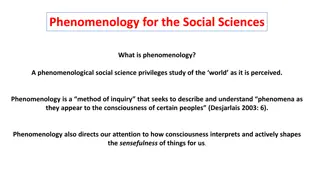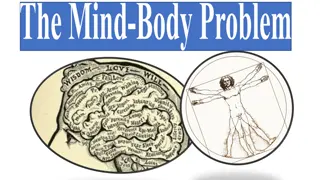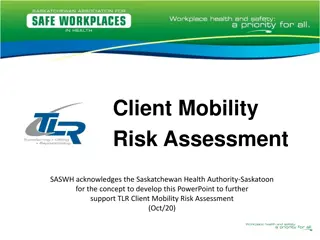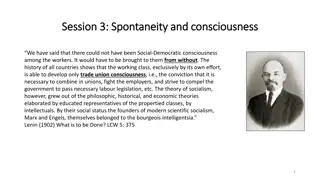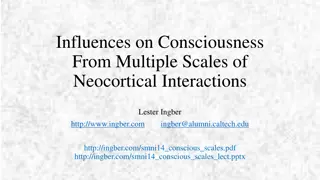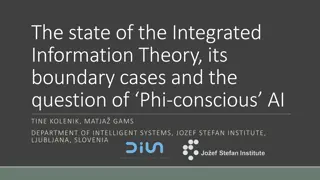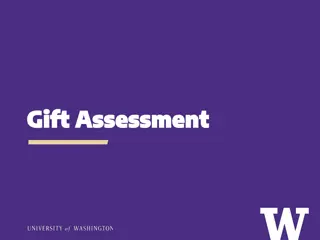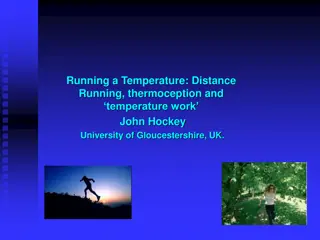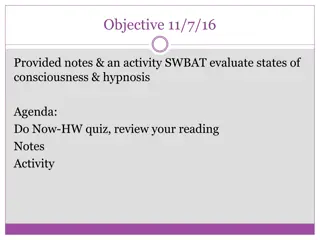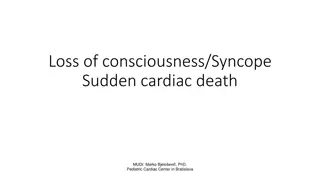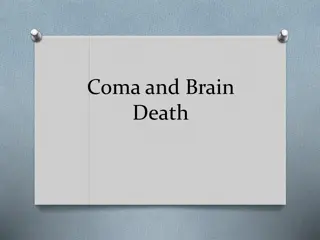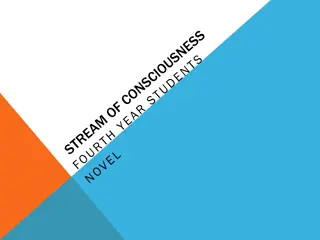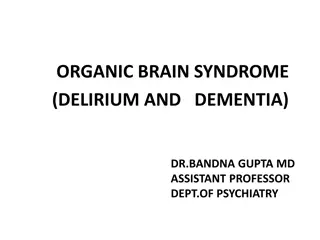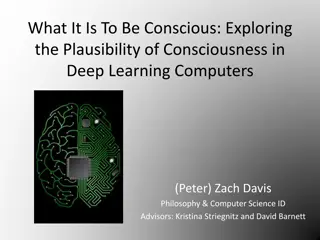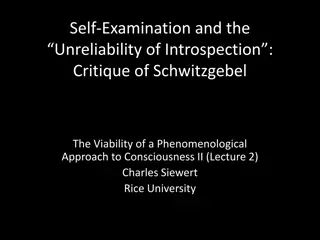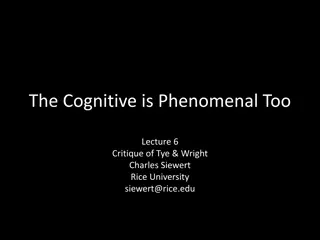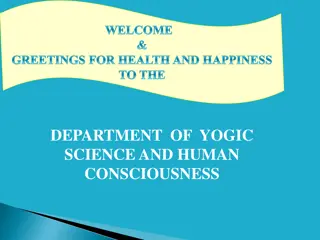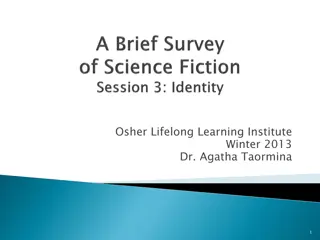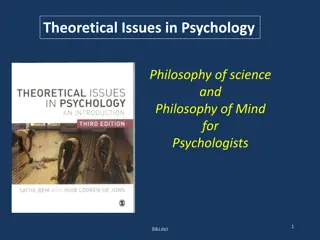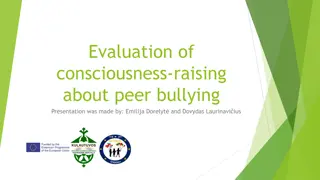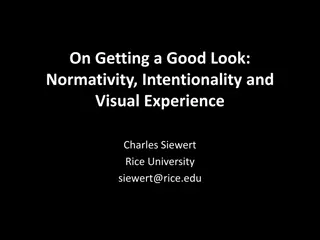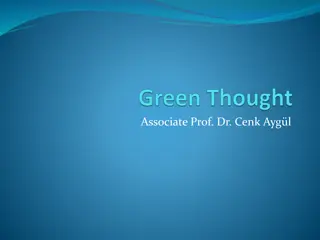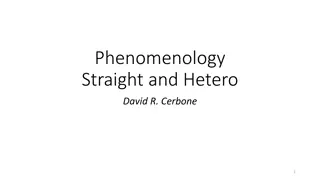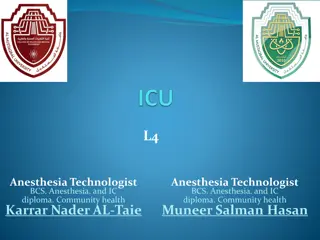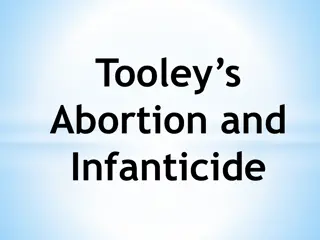Sheffield Early Help Assessment Form Update and Integration with Extended Support Plan
Sheffield has introduced an updated Early Help Assessment form to streamline the assessment process within the Early Help System. This new form combines the Early Help Assessment with the Extended Support Plan, aligning various assessment tools and referral forms into one comprehensive document. The
5 views • 22 slides
Enhancing Language Learning Through Peer Assessment
Explore the benefits of peer assessment as a valuable tool for language learning, comparing it with self-assessment. Discover the components and challenges of self-assessment, along with the potential of peer assessment to improve accuracy and promote self-regulation. Gain insights into what peer as
3 views • 29 slides
Understanding Fainting: Causes, Symptoms, and Treatment
Fainting, a sudden loss of consciousness, can be caused by various factors such as hyperventilation, heart disease, medications, alcohol use, and more. Recognizing symptoms like lightheadedness, weakness, and blurred vision is crucial. Learn how to assist someone who feels faint and what to do if th
0 views • 9 slides
Overview of DSW End Point Assessment Team Leader Level 3
DSW End Point Assessment Team Leader Level 3 provides a clear understanding of the assessment process, ensuring individuals comprehend why and when it occurs, responsibilities involved, and how DSW supports them. It covers topics such as what End Point Assessment entails, assessment design and deliv
1 views • 18 slides
Understanding Phenomenology in Social Sciences
Phenomenology in social sciences focuses on studying the world as perceived by individuals, emphasizing the active and passive aspects of consciousness. This approach explores how consciousness shapes our perception of the world and highlights the intentional acts and embodied experiences that give
0 views • 13 slides
The Mind-Body Problem: Exploring Consciousness and Intentionality
Delve into the intriguing questions surrounding the mind-body problem, such as the nature of consciousness, intentionality, subjectivity, and causation. Explore the mysteries of how thoughts, beliefs, and sensory experiences interact with the physical body and the external world. Contemplate the eni
0 views • 33 slides
Mobility Risk Assessment Process in Client Care
The Mobility Risk Assessment Process in Client Care involves conducting initial assessments to determine baseline mobility, identifying risks, selecting appropriate moving techniques, and effectively communicating and evaluating risks throughout care. The assessment considers communication status, p
1 views • 31 slides
The Role of Consciousness in Social-Democratic Thought
The development of socialist consciousness among the working class is discussed, emphasizing the need for outside influence to foster class and political awareness. Key figures such as Lenin and Kautsky are cited in their exploration of how consciousness is acquired and its significance in the labor
0 views • 6 slides
Exploring Influences on Consciousness Through Neocortical Interactions
Delve into the intriguing realm of consciousness with Lester Ingber's research on the influences stemming from multiple scales of neocortical interactions. The investigations cover various aspects such as mind over matter, recursive interactions, neuronal scales in the neocortex, and statistical mec
1 views • 41 slides
Understanding Assessment in Medical Education
Exploring the concepts of assessment in medical education, including defining assessment, types of assessment, reliability, validity, and aligning assessment methods with intended learning outcomes. The importance of constructive alignment and the impact of assessment on learning outcomes are also d
1 views • 12 slides
Assessment Matters in Sociology: Enhancing Learning Through Evaluation
Explore the significance of assessment in sociology education, focusing on key questions to evaluate current assessment procedures, review individual course assessments, and develop strategies to enhance student learning outcomes. Delve into the centrality of assessment in the learning process, with
1 views • 15 slides
Insights into Managing Assessment in the Classroom by Assessment Research Group
Explore the importance of standards and assessment in education through the lens of the Assessment Research Group. Gain valuable perspectives on curriculum delivery, understanding the assessment system, learner assumptions, task parameters, and more. Discover how language, structure, and agency play
2 views • 25 slides
Enhancing Understanding through Assessment in Educational Design Workshop
Learn and collaborate on assessment practices in education design at the "Understanding by Design Assessment Focus" workshop. The agenda includes sessions on summative and formative assessment, feedback, reporting, and more. Engage in activities like generating questions, finding destination partner
1 views • 76 slides
Understanding Altered States of Consciousness: Trance Practices in Different Cultures
Explore the ethnographic work on trance practices in Middle America and the Caribbean, comparing and contrasting how possession and trance phenomena are organized into types by anthropologists. Discover how shamans induce trances through mechanisms like singing, chanting, drumming, and dancing, lead
0 views • 18 slides
Institutional Assessment Planning Workshop Feedback and Insights
Feedback and insights from a recent institutional assessment planning workshop led by Dr. Mark Nicholas at FSU S. Warren Conference Center & Inn. Participants provided feedback on the usefulness of the content, presenter knowledge, ability to develop assessment plans, post-training assessment knowle
1 views • 9 slides
Exploring the Integrated Information Theory and Conscious AI
Delve into the Integrated Information Theory (IIT) and its impact on understanding consciousness, including its correlation with artificial intelligence. The IIT posits key axioms and postulates to define consciousness, exploring boundary cases and implications for AI development.
0 views • 11 slides
Understanding Higher Education Assessment: The Complete Guide
Higher education assessment involves a systematic process of collecting, reviewing, and utilizing information to improve student learning and development. This guide covers the assessment cycle, learning outcomes, the mission behind assessment in higher education, what assessment is and is not, reas
1 views • 36 slides
Understanding Gift Assessment Process at University of Washington
The Gift Assessment Process at University of Washington involves applying a 5% assessment to select current-use gifts over $1,000 and under $5 million. This assessment supports the university's advancement efforts and institutional priorities by transferring 5% of eligible contributions to the Provo
1 views • 5 slides
Overview of Environmental Impact Assessment and Strategic Environmental Assessment Directives
Environmental Impact Assessment (EIA) and Strategic Environmental Assessment (SEA) play crucial roles in evaluating the impact of planned activities on the environment. This content delves into the concept, origins, development, and key elements of environmental assessment, discussing the legal fram
2 views • 35 slides
The Phenomenology of Temperature Awareness in Distance Running
Researchers at the University of Gloucestershire explore the embodied consciousness of distance runners, focusing on thermoception and temperature regulation. Utilizing sociological phenomenology and phenomenological ethnography, the study delves into the sensory experiences of runners, emphasizing
0 views • 29 slides
Strawson's Thin Subjects in Consciousness: Exploring Emergence and Alternatives
Exploring the concept of Strawson's Thin Subjects in consciousness through the lens of emergence and alternative theories such as Panpsychism, Neutral Monism, and Dual-aspect Theory. Delve into the debate on whether experience is always accompanied by a subject of experience and the challenges posed
0 views • 16 slides
Understanding States of Consciousness and Hypnosis in Psychology
Explore the concept of consciousness and hypnosis in psychology through a series of engaging activities. Delve into topics such as the capacity of consciousness, dream analysis, and the effects of hypnosis on behavior. Gain insights into the basics of consciousness and its role in shaping our awaren
0 views • 27 slides
Institutional Assessment and Effectiveness Workshop Achievements at SUNY Oneonta
The Office of Institutional Assessment and Effectiveness at SUNY Oneonta has made significant progress in developing assessment protocols and processes, leading to a culture of assessment. This includes completing planning and assessment cycles, establishing objectives and procedures, and aligning u
1 views • 16 slides
Understanding Loss of Consciousness and Sudden Cardiac Death in Children
Loss of consciousness, including syncope and sudden cardiac death, is a significant concern in pediatric patients. The epidemiology shows that approximately 25% of children experience at least one episode of loss of consciousness before the age of 19, with girls visiting pediatricians more than boys
0 views • 5 slides
Understanding Coma, Brain Death, and the Examination Process
Exploring the definitions of coma and altered consciousness, understanding brain death examinations, criteria for determining brain death, who can perform the exam, Texas law on the definition of death, and components of a brain death exam. Learn about different states of altered consciousness, the
0 views • 14 slides
Understanding Stream of Consciousness in Literature: Examples from James Joyce and Virginia Woolf
Stream of consciousness is a narrative technique capturing the flow of characters' thoughts. James Joyce's "Ulysses" delves into Leopold Bloom's introspections, while Virginia Woolf's "Mrs. Dalloway" explores internal feelings. These examples showcase the vivid use of this literary device.
0 views • 9 slides
Understanding Organic Brain Syndrome & Delirium
Overview of organic brain syndrome and delirium, including definitions, clinical features, and management. Delirium, a common psychiatric syndrome, affects consciousness, cognition, and perception, leading to increased morbidity and mortality. Recognize core symptoms, such as disturbances in conscio
0 views • 37 slides
Exploring Consciousness in Deep Learning Computers
Delve into the plausibility of consciousness in deep learning computers through the lens of artificial neural networks and machine learning. While these technologies offer remarkable potential, the debate around their consciousness remains inconclusive.
0 views • 34 slides
Critique of Self-Examination and Unreliability in Introspection
The discussion revolves around the viability of a phenomenological approach to consciousness, critiquing the reliance on introspection and the unreliability of first-person judgments. The argument favors plain, analytical phenomenology over heterophenomenology, highlighting the challenges posed by f
0 views • 28 slides
Jewish Meditation Techniques for Stress Relief
Discover Jewish meditation techniques for centering the mind, utilizing breath as worship, Hebrew letters as channels of consciousness, and the primary technique of Havayah Breath. Learn how Jewish meditation aims to cultivate a sense of wellness and higher consciousness by focusing on the Divine th
0 views • 15 slides
Exploring Phenomenal Consciousness: Reducibility, Variation, and Cognitive Phenomenology
Delve into the rich realm of phenomenal consciousness, dissecting the interplay between sensory and conceptual elements. Contemplate the essence of cognitive activity, sensory features, and the potential inclusion of non-sensory aspects within consciousness. As you ponder reducibility, variation, an
0 views • 28 slides
Department of Yogic Science and Human Consciousness - Achievements and Courses Offered
Established in June 1996 under UGC's 9th 5-Year Plan, the Department of Yogic Science and Human Consciousness integrates ancient Indian learning, promotes moral values through yoga, and explores the benefits of yoga in various fields. They offer post-graduate courses in Yoga Studies & Therapy Manage
0 views • 14 slides
Exploring Human and Animal Consciousness in the Modern Era
Delve into the intricacies of human and animal consciousness, examining topics such as sentience, medical interventions, transplants, cyborgs, genetics, and the presence of consciousness in non-human animals. Discover how advancements like transplants, prosthetics, and scientific conclusions challen
0 views • 33 slides
Exploring Theoretical Issues in Psychology: Consciousness, Qualia, and Free Will
Delve into the complexities of consciousness, qualia, and free will in the realm of psychology, examining topics such as phenomenal experiences, naturalistic vs. mentalistic views, and the neurobiological perspective on emotions and self-consciousness.
0 views • 14 slides
Evaluation of Consciousness-Raising About Peer Bullying: Insights from a Presentation
The presentation on consciousness-raising about peer bullying by Emilija Dorelyt and Dovydas Laurinavičius included a participation questionnaire with 18 girls and 24 boys aged 14-16. Results showed disparities in awareness, sources of information, and responses to bullying between genders, highlig
0 views • 11 slides
Exploring Normativity and Visual Experience in Consciousness Philosophy
Charles Siewert from Rice University delves into the intersection of normativity and sensory experience within the realm of consciousness philosophy. He discusses the nonreductionist stance, a phenomenological approach, and the relationship between sensory experiences and judgments. The concept of g
0 views • 44 slides
Evolution of Environmental Consciousness: A Historical Perspective
The evolution of environmental consciousness is traced through key milestones like the emergence of ecological science, formation of environmental organizations, and the rise of New Social Movements. From the pioneering works of Ernst Haeckel to the foundation of Friends of the Earth and Greenpeace,
0 views • 15 slides
Contrasting Philosophical Perspectives: Husserl vs. Dennett
Phenomenologist Husserl and philosopher Dennett hold contrasting positions on consciousness, naturalism, methodology, and science, with Husserl emphasizing foundational philosophy and Dennett favoring a scientific approach. The divergence in their perspectives is centered on consciousness, with each
0 views • 128 slides
Understanding the Glasgow Coma Scale (GCS) in Healthcare
The Glasgow Coma Scale (GCS) is a critical tool for assessing the level of consciousness in patients, commonly used in head trauma cases but applicable across various medical settings. The GCS evaluates eye opening, verbal response, and motor responsiveness, assigning scores to each aspect to determ
0 views • 17 slides
Exploring Tooley's Argument on Abortion and Infanticide
Tooley challenges the common argument against abortion by proposing that fetuses and infants do not meet the Self-Consciousness Requirement (SCR) to have a right to life. He distinguishes between human and person, emphasizing the moral implications. The key questions raised revolve around the proper
0 views • 26 slides




